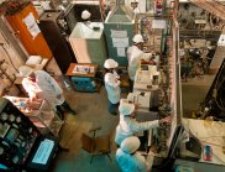Oct 11 2013
The widespread introduction of a clean-burning synthetic fuel, dimethyl ether (DME), is a step closer following the announcement of a A$6 million partnership between CSIRO and its Indian equivalent, the Council of Scientific and Industrial Research (CSIR).
The project will focus on improving processes involved in the production of DME, which is a fuel produced from natural gas (NG), coal, biomass, or even directly from carbon dioxide.
 CSIRO’s gas-to-liquids workshop.
CSIRO’s gas-to-liquids workshop.
Both Australia and India are currently unable to meet demand for petroleum products with domestic production alone. DME could help meet demand and consequently reduce both nations’ reliance on imported petroleum products.
According to CSIRO’s Dr Nick Burke, “There are over half a million vehicles currently using liquefied petroleum gas (LPG) in Australia - all of which could be powered using DME. The fact that DME can be used as a blend in existing LPG engines makes it an effective transitional fuel”.
“Australia’s heavy reliance on diesel could also be lessened with the added possibility of DME being able to replace diesel in the future” he said.
The leader of the Indian consortium Dr Garg explained that India’s demand for LPG is currently unable to be met by domestic production. “In India, LPG is currently used for cooking in more than 33 million homes and demand is increasing with imports rising rapidly” said Dr Garg.
Prof Paul Webley from The University of Melbourne said in addition to the economic benefits, DME will provide significant environmental benefits for both countries.
“DME produces significantly less pollution than conventional fuels and will therefore reduce urban pollution.”
The research will also assist in the development of small plants that may be suitable in remote and rural areas. Prof. Suresh Bhargava from Royal Melbourne Institute of Technology (RMIT) said “More efficient processing of gas into transportable fuels at remote locations would make Australia and India’s remote gas reserves more economically viable”.
Dr Burke said, “CSIRO has been collaborating with India across a range of areas for many decades, so we are excited to be expanding our relationship and collaborating on key issues affecting both nations.”
In addition to CSIRO and the Indian Institute of Petroleum (CSIR-IIP), the project will draw on the expertise of the Indian Institute of Technology (IIT-Roorkee), Bharat Petroleum Corporation Limited (BPCL), The Centre of Advanced Materials and Industrial Chemistry (CAMIC) at RMIT, and The University of Melbourne.
The three-year project is being jointly funded by the Australian and Indian governments, through the Australia-India Strategic Research Fund (AISRF).